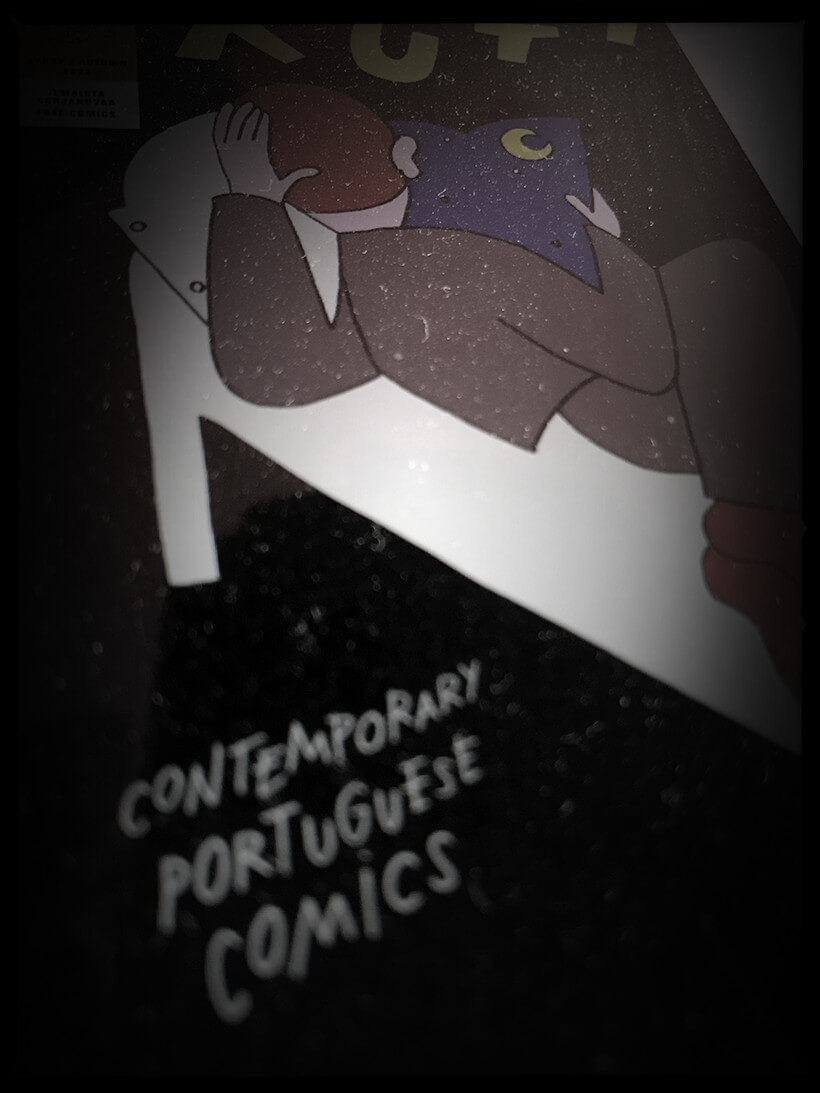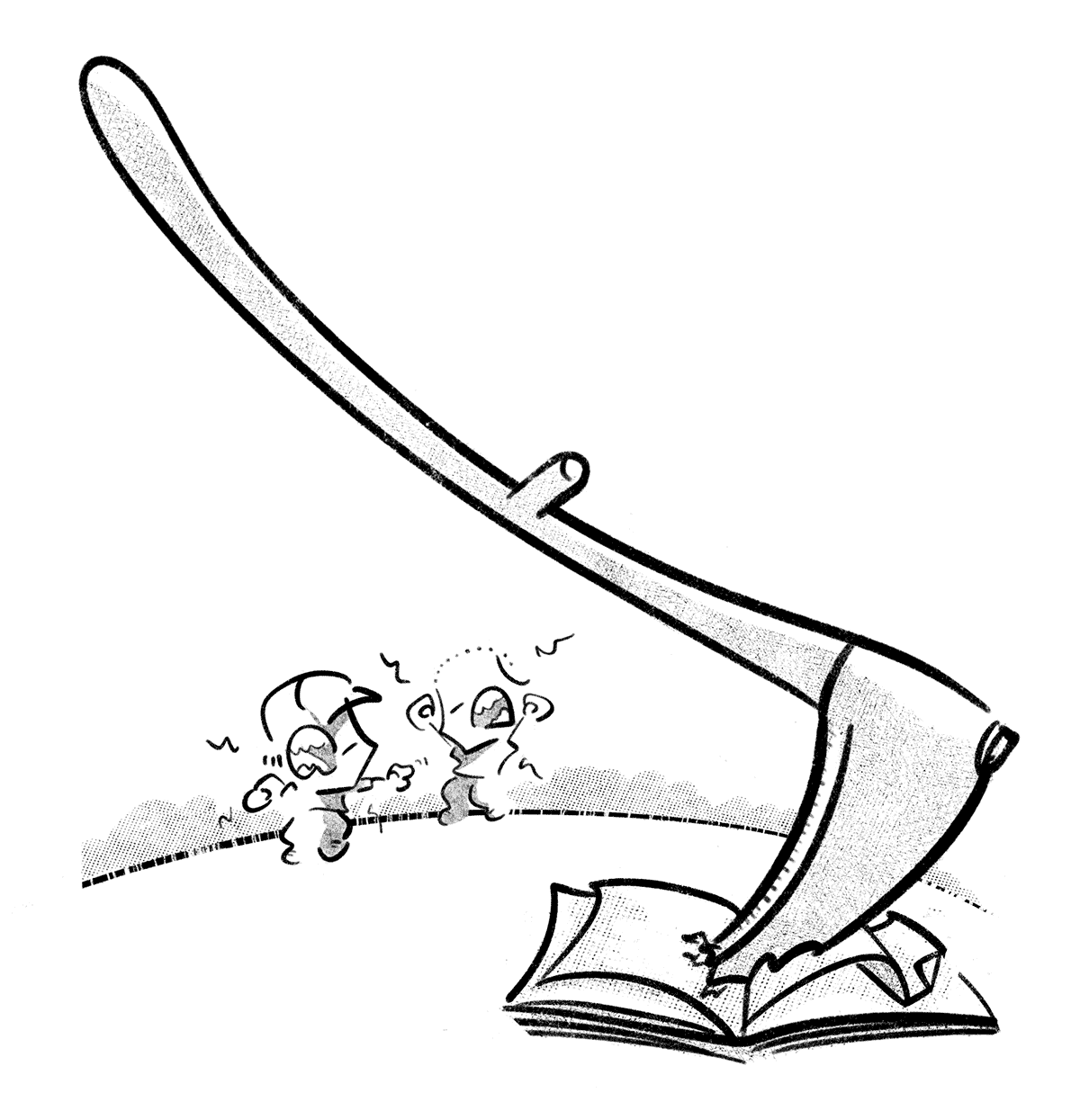os nossos contemporâneos

"A missed opportunity. That is how one could describe the contemporary scene of Portuguese comics in the last decades", Pedro Moura, na introdução ao "Kuti#65 - Contemporary Portuguese Comics" 2022. Self centered, a intro ao livro (64 páginas de ilustrações com alguma BD, snippets dos dois Rudolfos que sempre gostámos, um Pedro Burgos, et al. ) tenta-nos a esquecer que, fora as notas particulares que tocam o fado português, as últimas décadas foram uma oportunidade perdida em todo o lado, todas as coisas. Moura lastima o "zero effort in creating new readers and new situations, or contributing to internal, aesthetic transformations of the language of the comics medium"; nós lastimamos que os comics falhem igual esforço à transformação da sociedade. Também nada nos move contra a Chilli Com Carne, "co-conspirator for this issue", editora de projectos que nunca sentiriam a pressão do prelo de outro modo, mas novamente aqui a apresentação resume best: "One could argue that these gestures have rarely led to a more sustained and ongoing attention towards our own local production." Contem-nos one.
Ficámos do aborrecimento geral com mais uma feira do livro, memória e tempo, no tempo da internet. Extrapolemos, sigamos então com o declínio cultural em curso & contemporaneidades. Começamos no NYT, título sugestivo ("The Book That Explains Our Cultural Stagnation" 2022) e porque andamos todos aborrecidos com a cultura que temos. Cita-se Marx, Outro Marx ("Status and Culture: How Our Desire for Social Rank Creates Taste, Identity, Art, Fashion, and Constant Change" 2022 de W. David Marx):
Marx posits cultural evolution as a sort of perpetual motion machine driven by people's desire to ascend the social hierarchy. Artists innovate to gain status, and people unconsciously adjust their tastes to either signal their status tier or move up to a new one. "Status struggles fuel cultural creativity in three important realms: competition between socioeconomic classes, the formation of subcultures and countercultures, and artists' internecine battles." (...) The internet changes this dynamic. (...) With so much content out there, the chance that others will recognize the meaning of any obscure cultural signal declines. Challenging art loses its prestige. (...) When the value of cultural capital is debased it makes "popularity and economic capital even more central in marking status." As a result, there's "less incentive for individuals to both create and celebrate culture with high symbolic complexity."
in "The Book That Explains Our Cultural Stagnation" 29 ago 2022
Essa falta de incentivo é simultaneamente empurrada de cima e puxada de baixo. Outro Marx:
In the last few decades, mass culture successfully neutralized the constant aesthetic challenge of indie avant-garde experimentation, either by delegitimizing it as pretentious or quickly absorbing and defusing its innovations. The internet meanwhile promised to be weirder, more niche, and more interesting, and yet the zeitgeist is anchored to mega-moments, rehashed reboots, and lowest common denominator viral content.
We worry about cultural stasis only because we remember the dynamism of the 20th century. By this measure, 2012 being indistinguishable from 2017 makes us feel adrift. The enigma of 2022 is simply this: How can we both live in an infinite reservoir of entertaining culture and also feel a sense of stasis? The answer is not an absence of novelty and change but rather the absence of ordered sequential change.
in "21st Century Culture: Boring or Static? (Or both?)" 02 set 2022
Mudanças sequênciais ordenadas são-nos parte fundamental da definição, mas divagamos. Todos os filmes populares são reprises, os livros de sempre, fatahs antigas voltam à ordem do dia. Os miúdos ouvem as músicas que nós ouvíamos, os festivais enchem-se de bandas dos 80 e 90, banda sonora da nossa juventude que não devia ser também a deles. Sim, tudo isto é politics, tudo isto são histórias que não avançam a narrativa. Que nos levanta a hipótese (recuperada de par de anos atrás, portanto, bem dentro do loop que nos aborrece): "with this stagnation comes social torpor".
What if we inhabit an era in which repetition is more the norm than invention; in which stalemate rather than revolution stamps our politics? We probably aren't entering a 1930-style crisis for Western liberalism or hurtling forward toward transhumanism or extinction. Instead, we are aging, comfortable and stuck, cut off from the past and no longer optimistic about the future, while we await some saving innovation or revelation, growing old unhappily together in the light of tiny screens. The farther you get from that iPhone glow, the clearer it becomes: Our civilization has entered into decadence. Close Twitter, log off Facebook, turn off cable television, and what do you see? Campuses in tumult? No. Urban riots? No. A wave of political violence? A small spike, maybe, but one that's more analogous to school shootings than to the political clashes of the 1930s or '60s, in the sense that it involves disturbed people appointing themselves knights-errant and going forth to slaughter, rather than organized movements with any kind of concrete goal. The terrorist in 21st-century isn't the guy who sees more deeply than the rest; he's the guy who doesn't get it.
If you want to feel as if Western society is convulsing, there's an app for that. But in the real world, it's possible that Western society is leaning back in an easy chair, hooked up to a drip of something soothing, playing and replaying an ideological greatest-hits tape from its wild and crazy youth.
in "The Age of Decadence" 07 fev 2020
Caveat: não alinhamos essa decadência ao fim do gatekeeping (cultural) e declínio das elites, good riddance. Mas crê-se que as massas venceram, porém só foram bem sucedidas, "the decadent society is, by definition, a victim of its own success", Barzun,(*) ainda uma das nossas leituras prediletas:
When people accept futility and the absurd as normal, the culture is decadent.
Jacques Barzun in "The Age of Decadence" 07 fev 2020
O "Kuti#65 - Contemporary Portuguese Comics" está disponível para o vosso aborrecimento aqui.

